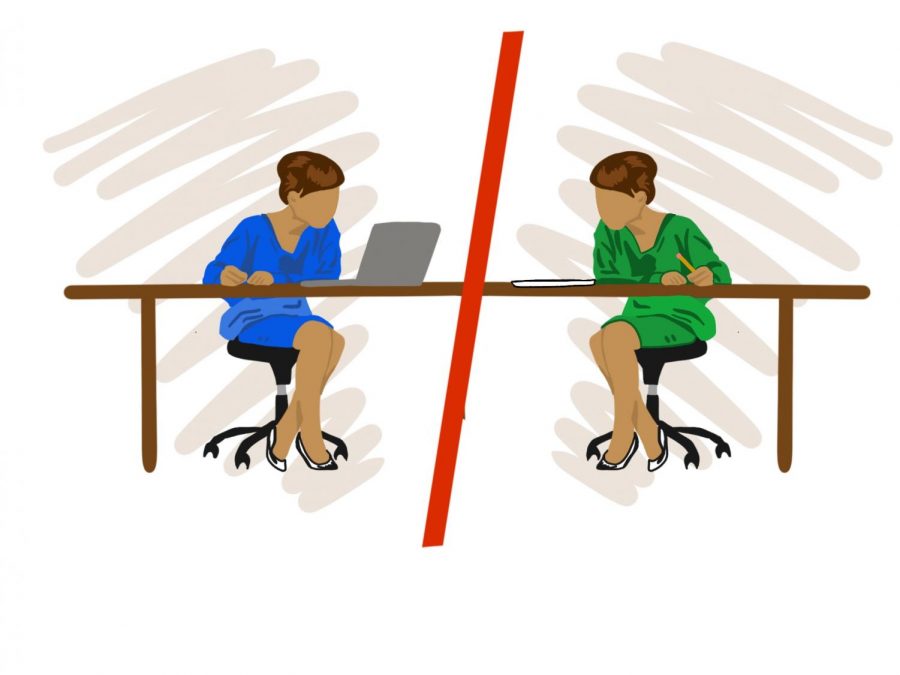Teachers and Students Are Optimistic About 2021 AP Exams
AP tests in 2021 are offered both on paper and digitally, as well as supervised and unsupervised. Staff illustration: Sophie Fang.
March 14, 2021
In January, the College Board announced that 2021 Advanced Placement (AP) exams will cover full course content, instead of repeating the shortened 45-minute exams administered in 2020 due to COVID-19. According to their website, the College Board believes that this decision will help them accurately assess whether students should earn college credit for AP courses and be placed in higher courses in college. Educators across the nation have criticized the College Board’s decision as inconsiderate to students who have been affected by the pandemic. However, some Menlo students and teachers remain optimistic about what full-length testing will mean for them.
“I’m not uncomfortable with giving the whole long test because [students] will have had everything [they] need to do really well on that test,” AP English Language teacher Maura Sincoff said. “What I am kind of curious about is what the AP plans in terms of [COVID-19] and honoring the distancing and how many people you have in a room.”
“If health and safety conditions allow, your school can offer in-person testing — and if not, that’s OK,” according to the College Board’s website. If a student is not able to take their exam at a school due to school closure or COVID-19-related risks, they will be able to take a full-length digital exam. These digital exams will include exam security measures intended to prevent academic dishonesty and will be reviewed using plagiarism software after they are turned in. “[Exams will] not include questions that can be answered with internet searches, textbooks, notes, study guides, or similar material,” according to the College Board’s website.
“I don’t think it’s ideal,” said AP Computer Science teacher Douglas Kiang. “Ideally the administration of the test should be as fair as possible. To be fair, you want to have a similar testing experience for everybody.” He is concerned that different students will be taking the exam online, on paper, supervised and unsupervised. “But we’re in the middle of a pandemic, and safety has to come first,” Kiang said. “I think it’s as good as it can be. If there was any way to have people take it in a safe testing environment on paper we would.”
Kiang worked for the College Board in the past and is on the development committee for the AP Computer Science Principles Exam. “What I’m saying now represents my own opinion and does not represent that of the College Board,” Kiang said. “Last year with the pandemic, we only had a few months to plan, and the College Board likes to plan a lot, and they are very consistent with equity. These exams they have been able to plan for over a year. They have had the luxury of time.” While exams this year might not be ideal, Kiang acknowledges that they are better than last year’s. “This year is closer to a testing environment they want,” Kiang said.
Sincoff is also worried about the transition from preparing for online AP exams to those on paper, if Menlo chooses to administer in-person AP exams for students. “How do you move from working online all year long and then suddenly having to start hand writing again?” Sincoff said. “[Students are] so used to typing that I’m concerned that that adjustment for some kids might prove a little bit challenging.” She believes that this aspect of 2021 AP exam preparation can still be improved at Menlo.
However, Sincoff believes that full-length exams could mean a better test-taking experience than last year. “Kids forget that there are advantages to everyone taking the test with the same prompts,” Sincoff said. Because last year’s exams were taken completely online, the College Board created multiple different prompts in order to minimize academic dishonesty. Sincoff believes that this created inequality amongst students. “Last year there were some inequities with prompts that were easier than others, and so scores were wildly different,” Sincoff said. “A lot of unexpected things happened because people got difficult prompts or easy prompts. I think there’s some equity that you get having a consistently solid, at the same time, and full length exam. Even though it’s a pain to sit there for the long period of time that you have to, you’re getting an accurate representation of all the skills, not just one.”
Junior Rupal Nimaiyar echoed this sentiment. “I think it’s good that they decided to make APs full length because the tests cover all the topics and materials from the class,” Nimaiyar said. “This way, I think there is a better assessment of someone’s skills of the subject, and there won’t be anything like someone getting a topic on the shorter exam that they’re bad at.” She also believes that Menlo teachers are doing a good job accommodating this year’s unusual AP exam status, but she acknowledges that the news might mean some additional work for students. “I think [studying for the exams will] be okay because AP teachers are cutting out units that are not on the AP,” Nimaiyar said.
Sincoff believes that Menlo students have a unique advantage, especially in AP English exams. “Kids at Menlo go into this test exceptionally prepared. Our scores kind of show that,” Sincoff said. “I think we’re at an advantage, because our students are motivated, doing the work, and locked into doing their best.” Kiang believes the same applies to the AP Computer Science A exam. “As far as Menlo goes, students will be well-prepared and will know the content,” Kiang said. Sincoff believes that Menlo students will ultimately meet their goals for AP exams, no matter what the circumstances may be. “We can do whatever they throw at us,” Sincoff said. “Bring it on, AP!”




Tracey Bobrowicz • Mar 18, 2021 at 10:21 am
As the AP Coordinator for Menlo, I want to remind students that they can easily check to confirm the type of exam and its date and time by going to myap.collegeboard.org and logging into their account. All the information should be there. If they have any questions, they should send me an email at tbobrowicz@menloschool.org